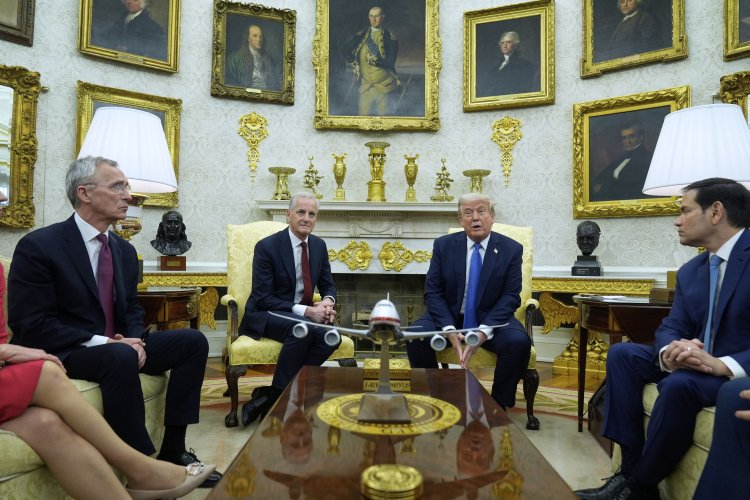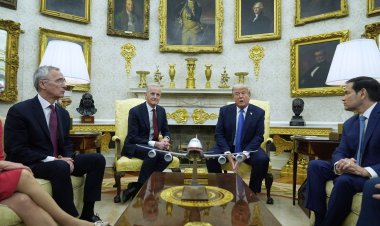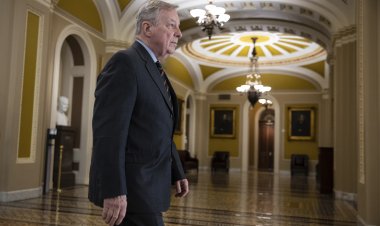Trump states he has his 'own deadline' for Ukraine discussions amid escalating tensions
During a meeting with Norwegian leaders, the president is exerting pressure on both Kyiv and Moscow to reach a peace agreement, though the emphasis is not distributed equally.

Trump reacted sharply when questioned about whether he was exerting equal pressure on Putin. “You have no idea what pressure I’m putting on Russia,” he retorted during a conversation with a reporter in the Oval Office. “We’re putting a lot of pressure on Russia.”
In a meeting with Norway's prime minister, Trump asserted that Russia is earnest about achieving peace, despite its overnight airstrikes on Ukraine’s capital, which he admitted he “didn’t like.” When pressed about the specific concessions he was seeking from Putin, Trump responded directly: “Stopping the war. Stopping taking the whole country — pretty big concession.”
More than three years since the invasion, Russia's military remains entangled in eastern Ukraine, with U.S. and NATO allies providing substantial support to Ukrainian forces. Trump appears reluctant to contemplate any further defense aid for Ukraine, claiming he wants to end the bloodshed on both sides. However, his eager pursuit of a significant foreign policy victory early in his second term clashes with the reality that Ukraine and Europe regard these issues as crucial to both their immediate and long-term security, which could even be existential.
“This isn’t my war. This is [former President Joe] Biden’s war,” Trump claimed, disputing assertions that his peace negotiation strategies are biased toward the Kremlin. “I have no allegiance to anybody. I have allegiance to saving lives.”
He noted that requiring Ukraine to cede territory to Russia, which initially invaded without provocation, is necessary to conclude the ongoing conflict. “We’ll do the best we can working with Ukraine,” Trump remarked. “But they’ve lost a lot of territory.”
Despite expressing confidence that “we’re going to get it done,” Trump signaled that he possesses “his own deadline” for a deal, though he refrained from providing specifics. “We want it to be fast,” he stated. “We have a deadline. After that, we will have a very much different attitude.”
Former NATO Secretary General Jens Stoltenberg, who accompanied Norwegian Prime Minister Jonas Gahr Støre to the White House, may hold sway over Trump regarding Ukraine. Stoltenberg, previously a prime minister of Norway, has been viewed as an effective figure in engaging with this administration.
“The president really likes and trusts him,” a White House official shared, requesting anonymity due to restrictions on discussing personnel relationships publicly.
During a lunch with Støre and Stoltenberg, Trump praised the former NATO leader for his successful tenure in charge of the alliance, while hinting that America’s commitment to the defense of the 31 member countries isn’t absolute. When queried about whether he considered NATO “sacrosanct,” Trump pondered the question, implying that the organization's power heavily relies on the United States. “It's very important for Europe,” he said. “Without us, it wouldn't be nearly as powerful.”
Stoltenberg likely played a significant role in arranging this meeting between Støre and Trump, especially since the president’s “reciprocal” tariffs are currently on hold and nations are keen to finalize trade agreements with the U.S.
Given that Norway is not part of the EU, Støre is among the few foreign leaders to meet with Trump since recent trade tensions escalated three weeks ago. The primary concern for Stoltenberg and other European leaders remains the war in Ukraine.
In a Wednesday evening interview, Stoltenberg highlighted his message to Trump regarding the defense of Ukraine and its alignment with broader security interests. “If Putin wins in Ukraine, if Putin gets what he wants, it will make the world more dangerous,” he cautioned. “It will demonstrate for him, but also for other authoritarian leaders, that when they use military force, when they violate international law, when they invade another country, they get what they want.”
Stoltenberg emphasized that Putin’s victory would impart important lessons not just to him, but also to leaders like Xi in China, making it vital for global security to support Ukraine.
In the Oval Office, Stoltenberg carefully communicated pride in Norway’s contributions to Ukrainian defense efforts. Meanwhile, Støre praised Trump as a force for peace negotiations but noted that their perspectives might not fully align. “It is a complex picture, but it needs political will and push,” the prime minister stated. “And we have exchanged ideas on that. And I think the president and his team have been open to hear our perspective.”
Trump and Secretary of State Marco Rubio have clearly indicated their patience with delays by both Ukraine and Russia is waning, leading the U.S. to withdraw from scheduled peace talks with Ukrainian officials in London this week. At the same time, Trump envoy Steve Witkoff is set to meet with Putin again.
In a social media post, Trump reiterated his frustration with Ukrainian President Volodymyr Zelenskyy, criticizing the latter’s public refusal of a key aspect of the proposed U.S. peace deal—recognizing Russian control over Crimea, which was annexed in 2014—as “very harmful” to negotiations. “If he wants Crimea, why didn’t they fight for it eleven years ago when it was handed over to Russia without a shot being fired?” Trump remarked, overlooking the fact that the Obama administration and European allies chose not to enforce the Budapest Memorandum’s terms due to concerns about provoking Putin.
“It’s inflammatory statements like Zelenskyy’s that makes it so difficult to settle this War,” Trump added. “He has nothing to boast about! The situation for Ukraine is dire — He can have Peace or, he can fight for another three years before losing the whole Country.”
Meanwhile, the president suggested that Russia has effectively agreed to a peace deal that, as described by an anonymous source, would halt the conflict along current battle lines and grant Russia control over roughly one-fifth of Ukraine’s territory. While Russia would see the lifting of economic sanctions, Ukraine would need to depend on security guarantees without firmly established U.S. military backing and rely on Europe for future defense aid in the event of further aggression.
In the Oval Office, Trump blamed former President “Barack Hussein Obama” for the failure to respond adequately to the seizure of Crimea but acknowledged that fulfilling Ukraine’s demand for the territory to be returned would pose a significant challenge.
Although Trump expressed discontent with Russia’s actions in Kyiv, his comments on social media were more subdued than his earlier criticisms of Zelenskyy. His plea to Putin reflected his urgency: “I am not happy with the Russian strikes on KYIV. Not necessary, and very bad timing. Vladimir, STOP! 5000 soldiers a week are dying. Lets get the Peace Deal DONE!”
When asked about his belief in Putin's commitment to peace during a greeting with Støre, Trump responded affirmatively. However, later in the Oval Office, when questioned about potentially imposing additional sanctions on Russia should it continue to escalate the conflict, Trump opted for a cautious approach. “I’d rather answer that question in a week. I want to see if we can have a deal,” he stated. “There’s no reason to answer that now.”
Max Fischer for TROIB News












